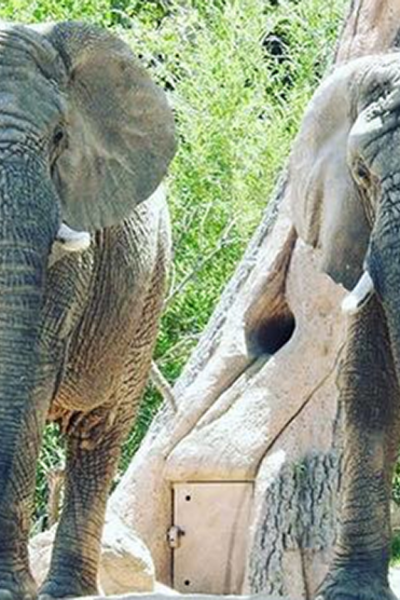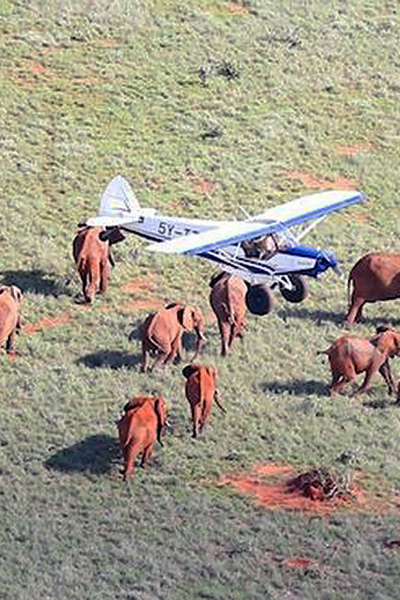Conservation
Cheyenne Mountain Zoo’s Quarters for Conservation program has allowed us to send more support to Tsavo Trust – a field-based non-profit organization in Africa that uses aerial surveillance and on-the-ground field efforts to protect wildlife in Tsavo National Park, the largest national park in Kenya. The organization was founded to help protect the last of the big “tuskers,” which are likely the last viable genetic pool of African elephants with tusks weighing more than 100 pounds each. The park is also home to a number of black rhino sanctuaries established by the Kenya Wildlife Service (KSW) and supported by the Zoological Society of London. The black rhino is critically endangered, due primarily to illegal poaching for their horns.
In partnership with the Kratt Foundation, CMZoo sent $53,333 in August to help support ongoing anti-poaching aerial surveillance efforts. These funds helped complete the construction of staff housing at Tsavo Trust and provided funding support for two support staff positions. This donation means Tsavo Trust can continue to monitor and protect roughly 16,000 miles of land that is vital to the survival of these endangered species.
“Our guiding principles ensure that our elephants here in human care have a direct connection to the protection of wild elephants,” said Bob Chastain, Cheyenne Mountain Zoo president and CEO. “That’s why we do the elephant and rhino feedings. We want it to be more than a theoretical connection. Each year, $25,000 of the money raised from our elephant and rhino feedings goes directly to this cause.”
This most recent donation brings CMZoo’s total Tsavo Trust support to $145,000, thanks to our our elephant and rhino feeding fundraisers, the Quarters for Conservation program and the Kratt Foundation.
“Tsavo Trust acts as a watchdog, working closely with the Kenya Wildlife Service to monitor a vast area for signs of poaching and illegal grazing,” Chastain said. “They also ensure deceased elephants’ tusks aren’t found by poachers and sold on the black market, which helps reduce the attraction to ivory overall.”
Aside from their antipoaching and illegal grazing prevention efforts, Tsavo Trust leads a number of creative solutions, like their program to establish honeybee colonies near farmlands.
 Elephants, as majestic as they are, can cause severe damage to agricultural lands. Because they are naturally discouraged by the presence of honeybees, Tsavo Trust helped implement a program through which local farmers could install hives to stop elephants from entering areas that humans depend on for food and income. This innovation protects humans and elephants by lowering the chance of a human-elephant encounter, when elephants can be harmed or killed by humans who need to protect their means. Furthermore, the honey has become a new economic resource.
Elephants, as majestic as they are, can cause severe damage to agricultural lands. Because they are naturally discouraged by the presence of honeybees, Tsavo Trust helped implement a program through which local farmers could install hives to stop elephants from entering areas that humans depend on for food and income. This innovation protects humans and elephants by lowering the chance of a human-elephant encounter, when elephants can be harmed or killed by humans who need to protect their means. Furthermore, the honey has become a new economic resource.
In addition to those efforts and many more, Tsavo Trust pilots invite government officials to join them on aerial survey expeditions, which can motivate people in influential positions to take inspired action toward wildlife conservation.
Historically, CMZoo donations to Tsavo Trust paid for airplane hours and fuel for anti-poaching efforts. But, when Chastain visited their headquarters in May 2017, he noticed they needed assistance in additional areas.
“It’s hard for them to get experienced employees to their remote location who can adequately support Richard Moller, Tsavo Trust CEO, and the future of the organization,” said Chastain. “The nearby major city is about a four-hour drive from Tsavo Trust headquarters. Our support over the past year has helped them build two houses: one for the pilot and one for a business administrator. This allows the organization to have a more solid foundation, rather than its operational success depending entirely on Richard.”
Cheyenne Mountain Zoo will occasionally support other rhino and elephant conservation efforts, but Tsavo Trust is the Zoo’s legacy partner.
From January to August 2018, the small-but-mighty Tsavo Trust team made 22 arrests, recovered 79 tusks and removed 673 snares and traps in Tsavo National Park. They continue working to protect the 12 remaining and accounted-for giant tusker elephants and endangered black rhinos in Kenya.
To learn more about Cheyenne Mountain Zoo’s Q4C program to fund conservation, visit www.cmzoo.org/q4c.






